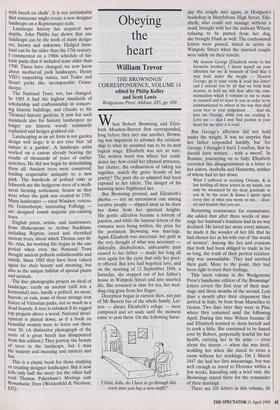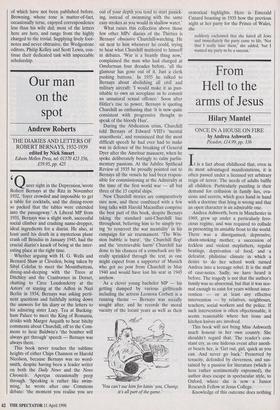Obeying the heart
William Trevor
THE BROWNINGS' CORRESPONDENCE, VOLUME 14 edited by Philip Kelley and Scott Lewis Wedgestone Press! Athlone, £85, pp. 450 When Robert Browning and Eliza- beth Moulton-Barrett first corresponded, long before they met one another, Brown- ing was impatient to advance the relation- ship to what he assumed was to be its next logical stage. Elizabeth was not so sure. The written word was where her confi- dence lay: how could her physical presence, her chatter, the ordinariness of taking tea together, match the grave beauty of her poetry? The poet she so admired had been exposed to her talent. The danger of his knowing more frightened her.
But Browning pressed, and Elizabeth's phobia — not an uncommon one among creative people — slipped away as he drew her down from her spiritual heights. His gentle affection became a torrent of passion, and while the famous letters of the romance were being written, the prize for the persistent Browning was marriage. Again Elizabeth was uncertain: her guilt at the very thought of what was necessary disloyalty, disobedience, unbearable pain caused to her father — made her long all over again for the eyrie that only her poet- ry offered. But love had begotten love, and on the morning of 12 September 1846, a Saturday, she stepped out of her father's house in Wimpole Street and into married life. She returned in time for tea, her wed- ding ring gone from her finger.
Deception began in earnest then, not just of Mr Barrett but of the whole family. Let- ters — always Elizabeth's refuge — were composed and set aside until the moment came to post them. On the following Satur- `Christ, Julie, do I have to go through this every time you buy a new outfit?' day the couple met again, at Hodgson's bookshop in Marylebone High Street. Eliz- abeth, who could not manage without a maid, brought with her the stalwart Wilson; refusing to be parted from her dog, she brought Flush as well. The confessional letters were posted, timed to arrive in Wimpole Street when the married couple were safely on their travels: My dearest George [Elizabeth wrote to her favourite brother], I throw myself on your affection for me & beseech of God that it may hold under the weight — Dearest George, go to your room & read this letter! and I entreat you by all that we both hold dearest, to hold me still dear after the com- munication which it remains to me to make to yourself and to leave to you in order to be communicated to others in the way that shall seem best to your judgement . , And oh, love me George, while you are reading it. Love me — that I may find pardon in your heart for me after it is read.
But George's affection did not hold under the weight. It was no surprise that her father responded harshly, but 'for George, I thought it hard, I confess, that he should have written. . . with a sword'. In Roanne, journeying on to Italy, Elizabeth recorded this disappointment in a letter to her sisters, Arabella and Henrietta, neither of whom had let her down.
What I suffered in reaching Orleans, & at last holding all these letters in my hands, can only be measured by my deep gratitude to you & by the tears & kisses I spent upon every line of what you wrote to me. .. dear- est and kindest that you are.
Returning reassurance for reassurance, she added that after three weeks of mar- riage her husband's fondness had in no way declined. He loved her more every minute, he made it the wonder of her life that he had chosen her as his wife out of 'the world of women'. Among the lies and evasions that both had been obliged to trade in for so long, the truth of their perfect relation- ship was unassailable. They had survived their guilt. More to the point, they had been right to trust their feelings.
This latest volume in the Wedgestone Press's handsome edition of the Brownings' letters covers the first year of their mar- riage and three months of the second. Less than a month after their elopement they arrived in Italy, by boat from Marseilles to Genoa. Two days later they were in Pisa, where they remained until the following April. During this time Wilson became ill and Elizabeth learned to dress herself and to cook a little. She continued to be fussed over by Robert, perpetually fearful for her health, carrying her in his arms — even about the streets — when she was tired, scolding her when she dared to cross a room without her stockings. On 1 March 1847 she had her first miscarriage, but was well enough to travel to Florence within a few weeks. Intending only a brief visit, the Brownings stayed there for the remainder of their marriage.
There are 101 letters in this volume, 60 of which have not been published before. Browning, whose tone is matter-of-fact, occasionally terse, enjoyed correspondence less than his wife did; most of the letters here are hers, and range from the highly charged to the trivial. Supplying lively foot- notes and never obtrusive, the Wedgestone editors, Philip Kelley and Scott Lewis, con- tinue their dedicated task with impeccable scholarship.



































































 Previous page
Previous page